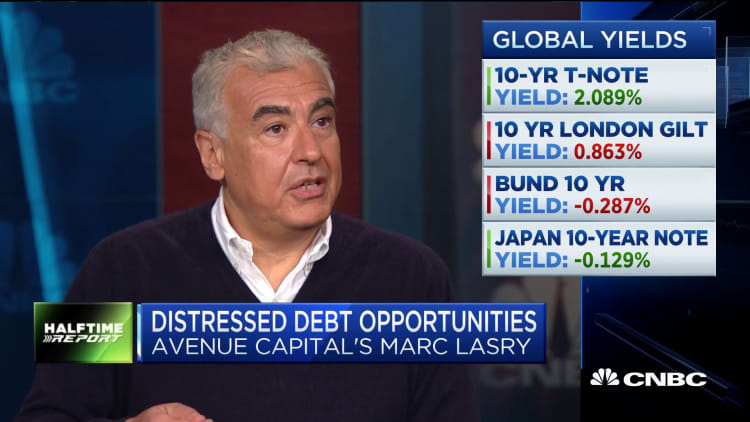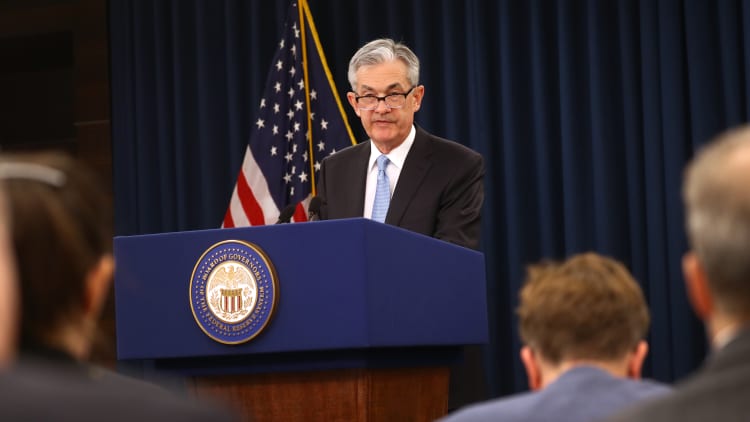Marc Lasry, the billionaire investor whose firm Avenue Capital Group focuses on distressed securities, pointed abroad rather than at home when asked where he is finding opportunities as rates get lower everywhere.
In terms of distressed debt, "there's a huge opportunity in Europe right now simply because of Brexit," Lasry argued on Wednesday's "Halftime Report." Unlike in the U.S., where it's "clear you're not going into recession," Lasry thinks "in Europe because of the uncertainty on Brexit, there'll be a lot more to do because people are nervous."

Asia is the other place Lasry is stepping in. "Why? Because China's slowing down. Going from 6% to 4% growth, that's great if you're in the U.S. If you're in Asia, that means all of a sudden everything slows down by 25%."
Lasry's strategy in Asia is direct lending for short periods, such as 1-2 years, at high rates. He sees opportunity because "Chinese banks are cutting back on lending money outside of China. What you're finding is that banks are tightening so there's more opportunity for firms like ours, because we're doing direct lending and stepping in. In Asia we're charging 15-20%. Think about it. You've got a zero rate environment or a 2% environment, and we're able to charge anywhere between 7 to 10 times that amount."
Why is this strategy working? "People today in Asia overvalue their equity. They don't want to give up equity, and they'd rather pay 15-20%. In the U.S., we're actually like, no at 15%, here's equity. That's the big difference" between Asia and the U.S. right now.
But that doesn't mean Lasry sees no opportunity in the U.S. He continues to champion U.S. energy debt, which he has previously called a "once in a generation" opportunity. Now he admits, "That generation was about a year and a half… things took off, and now [prices] have actually gone even lower."
"The market is saying it doesn't like energy [companies] right now. Valuations are so low, we're finding huge opportunities. Ultimately, this trade should work out." For Lasry to be right, he concedes that the sentiment around energy needs to change.

As for bonds, Lasry took profits in GE. "The bonds moved up so we ended up getting out… We love to buy things at 70, 75 cents on the dollar. When it gets up to 90, 95, there isn't as much room, obviously, for capital appreciation. So, we'll get out."
He continues to hold Tesla bonds but recommends keeping an eye on the equity value and thus the risk. "It's got $40 billion of equity value. It's got $7 billion of bonds. Right now the market is telling us it's got a $47 billion enterprise value... You get about a 7% current [rate], which is pretty good. I think you're oversecured today but if all of a sudden that equity value drops to about $20 billion or $15 billion…at that point we'll probably get out of those bonds because I don't want to take that risk."
The newest credit opportunity Lasry sees is in Revlon unsecured bonds. His argument is that Revlon Chairman Ronald Perelman owns 85% of the company and "he's not going to let this company go into bankruptcy... Mr. Perelman will refinance those bonds in a year and a half or he would lose control of the company. So we're pretty comfortable we're going to get paid out." The bottom line? "You're getting paid to wait. That's really what I like."
As for the big picture, Lasry's outlook for the U.S. is cautiously optimistic -- "a year from now the economy is going to be fine." Keeping the overseas lens, though, he warns, "We're becoming Europe. We're going to be growing at 1 or 2 percent. That's not real growth. That's not good for equities."



